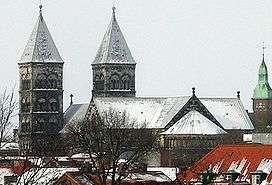List of Romanesque buildings
–Listed below are examples of surviving buildings in Romanesque style in Europe, sorted by modernday countries.
List
Austria
- Gurk Cathedral, Gurk, Carinthia
- Ossiach Abbey, Ossiach, Carinthia
- Virgilkapelle, Vienna
- Benedictine Abbey, Millstatt, Carinthia
- Stiftskirche, Geras, Lower Austria
- Stiftskirche, Göß, Leoben, Styria
- Lambach Abbey
- Schöngrabern, Hollabrunn, Lower Austria
Belgium
- Notre-Dame Cathedral in Tournai (Doornik)
- abbey in Nivelles (Nijvel)
Bulgaria

Croatia
- St. Anastasia, Zadar
- St. Benedict, Split
- St. Peter, Rab
- St. Mary the Blessed, Rab
Czech Republic
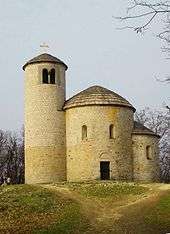
- St. Longin's Rotunda in Prague
- Rotunda of The Holy Cross in Prague
- St. George's Basilica, Prague (Bazilika svatého Jiří, Praha)
- St. Bartholomew's Church in Prague-Kyje
- St. George's Rotunda on Říp Mountain
- Castle and rotunda in Týnec nad Sázavou
- St. Peter and Paul (Petr a Pavel) Church in Poříčí nad Sázavou
- St. Jacob's (Jakub) Church in Cirkvice (near Kutná Hora)
- St. Procopius Basilica in Třebíč
- St. Peter's Rotunda in Starý Plzenec
- St. Peter and Paul Rotunda in Budeč (near Zákolany u Kladna)
- Rotunda of the Virgin Mary and St. Catherine in Znojmo
- St. Martin's Rotunda in Vyšehrad, Prague
- St. Catherine's Rotunda in Česká Třebová
- Basilica of the Assumption of the Virgin Mary in Tismice (near Český Brod)
- St. Bartholomew's Church in Kondrac (near Vlašim)
- Basilica of the Visitation of Our Lady, Premonstratensian Monastery in Milevsko
- Zdík's Palace (Zdíkův palác) in Olomouc
- Landštejn Castle
France


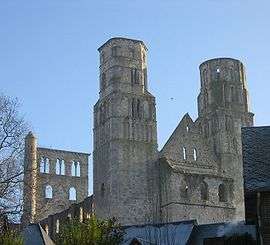
Romanesque architecture expands in France through monasteries. Burgundy was the center of monastic life in France - one of the most important Benedictine monastery of medieval Europe was the one in Cluny. The pilgrimage also contributed to expansion of this style. Many pilgrims passed through France on their way to Santiago de Compostela.
French Romanesque schools of architecture, which are specific for every region, are characterised by the variety of stone vaulting.
- Regions that developed distinctive styles are:
- Burgundy
- abbey church, Cluny
- Saint-Bénigne, Dijon
- Autun
- St Philibert at Tournus
- Provence
- Church of St. Trophime and cloister, Arles
- Tour Fenestrelle, Uzès
- Abbey of Sénanque, Gordes
- Le Thoronet Abbey, Brignoles
- Fréjus Cathedral, Fréjus
- Silvacane Abbey, La Roque-d'Anthéron
- Montmajour Abbey, Arles
- Aquitaine
- Saint-Front, Périgueux
- Notre-Dame-la-Grande, Poitiers
- Saint-Pierre, Angoulême
- Sainte-Croix, Bordeaux
- Auvergne
- Saint-Foy, Conques
- Saint-Sernin, Toulouse
- Notre-Dame-du-Port, Clermont-Ferrand
- Saint-Austremoine, Issoire
- Notre-Dame, Orcival
- Normandy
- Saint-Étienne, Caen,
- abbey church, Jumièges, Seine-Maritime
- abbey church of Saint-Georges-de-Boscherville, Seine-Maritime
- Sainte-Trinité, Caen, Calvados Calvados
- Cerisy-la-Forêt, Manche
- Lessay, Manche
- Saint-Nectaire
- Saint-Saturnin
- Sainte-Madeleine, Vezelay
- Basilica of Paray-le-Monial
- Abbey Church of Saint-Savin-sur-Gartempe
- Chapaize
- Abbatiale de Cruas
- Abbey of Vigeois, Limousin
- Fontevraud Abbey
- Saint-Martin-du-Canigou, Roussillon
Germany


- Bamberg Cathedral
- Bonn Minster
- Cologne
- the twelve Romanesque churches of Cologne, include Gross St Martin, St. Maria im Kapitol with fine wooden doors, the central plan St. Gereon, St. Aposteln, St. Pantaleon
- Freising, Cathedral
- Goslar Cathedral, Imperial Palace, Goslar
- Hildesheim
- Mainz Cathedral
- Maria Laach Abbey
- Regensburg: Schottenkirche St. Jakob
- Trier Cathedral
- Speyer Cathedral
- Straubing: St. Peter's Church
- Worms Cathedral
- Würzburg Cathedral
Hungary

- Calvinist church, Ócsa (e. 13th century)
- Parish church of the Annunciation of Our Lady, Türje (e. 13th century)
- Parish church of St. James the Apostle, Lébény (c. 1190-1212)
- Parish church of St. George, Ják (c. 1220-1256)
- Abbey Church of the Assumption of Our Lady, Belapatfalva (1232–1246)
- Cathedral of Pécs Pécs (11th century, 1882–1891)
- Royal palace at Esztergom Esztergom (10th-13th century)
- Pannonhalma Archabbey (certain parts) Pannonhalma (11th-13th century)
Ireland
- Cormac's Chapel, Cashel (1127–1134)
- Aghadoe, County Kerry (1158)
- Nuns' Church, Clonmacnoise (1167)
- Tuam Cathedral and Crosses (c. 1184)
- Ardmore Church and Round Tower, County Waterford
- Baltinglass Cistercian Abbey, County Wicklow
- Boyle Cistercian Abbey, County Roscommon
- Christ Church Cathedral, Dublin
- Clonfert Cathedral, County Galway
- Cong Abbey, County Galway
- Devenish Round Tower and Churches, County Fermanagh
- Dysert O'Dea Church and Round Tower, County Clare
- Freshford, County Kilkenny
- Jerpoint Cistercian Abbey, County Kilkenny
- Killeshin, County Laois
- Maghera, County Londonderry
- Monaincha Abbey and Cross, County Tipperary
- Rahan Church of Ireland Church, County Offaly
- Timahoe Round Tower, County Laois
- St. Saviour's, Glendalough
Italy
In Italy, the prevalent diffusion is in Lombardy, in Emilia - Romagna, in Tuscany, in the continental part of Veneto and in Apulia; everyone of these "Romanesque styles" has proper characteristics, for constructing methods and for materials. For example, a characteristic of Romanesque is that to change the classic elements with Christian elements, but in Tuscany and Apulia the classic decoratings remain.
Materials depended from the local disponibility, because the importation was too expensive. In fact, in Lombardy the most used material is ceramic, because of the argillous nature of the terrain; but that is not true for Como, where there were large diponibility of stone; in Tuscany buildings in white marble (from Carrara) are frequent, with inserts of green serpentin marble.
In Lombardy and Emilia, in that age united, in Romanesque epoque there was a great artistic flowering. The most monumental churches and cathedrals are often built with the campata system, with varying columns which weigh a tutto sesto arcos. In plain the material of construction is prevalently the mattone, but buildings in stone do not lack. The greater part of the Roman cities along the via Emilia is equipped in this age of monumental cathedral, between which they already maintain to the medieval system.
Abruzzo
Aosta Valley
Emilia-Romagna
- Modena Cathedral -
 Media related to the Modena Cathedral at Wikimedia Commons
Media related to the Modena Cathedral at Wikimedia Commons - Abbey of San Mercuriale, Forlì and campanile -
 Media related to San Mercuriale at Wikimedia Commons
Media related to San Mercuriale at Wikimedia Commons - Chiesa di S. Maria Oliveto (Albinea - province of Reggio Emilia)
- Parma Baptistery -
 Media related to Parma Baptistery at Wikimedia Commons
Media related to Parma Baptistery at Wikimedia Commons - Parma Cathedral -
 Media related to the Parma Cathedral at Wikimedia Commons
Media related to the Parma Cathedral at Wikimedia Commons - Piacenza Cathedral -
 Media related to the Piacenza Cathedral at Wikimedia Commons
Media related to the Piacenza Cathedral at Wikimedia Commons
Friuli-Venezia Giulia
- Basilica di Poppo, Aquileia, province of Udine
- Basilica patriarcale, Aquileia - province of Udine
Latium
- Cathedral of Acquapendente (province of Viterbo)
- Church of S. Maria della Libera (Aquino - province of Frosinone)
Lombardy
- Sant'Ambrogio, Milan
- San Lorenzo, Milan
- Duomo vecchio, Brescia
- San Michele Maggiore, Pavia
- Cathedral of Monza
- S. Cosma e Damiano (Rezzago - province of Como)
- Madonna del Ghisallo (Magreglio - province of Como)
- S. Alessandro (Lasnigo - province of Como)
- S. Pietro (Albese - province of Como)
- Chiesa di S. Tommaso (Acquanegra sul Chiese - province of Mantova)
- Sant'Abbondio (Como)
- San Tomè (Almenno San Bartolomeo - province of Bergamo)
Marche
- Church of S. Ciriaco (Ancona)
- Pieve of S. Maria della Piazza (Ancona)
- Pieve of S. Urbano (Apiro - province of Macerata)
- San Vittore alle Chiuse
Piedmont
- Vezzolano Abbey (Albugnano - province of Asti)
- Crypt of Sant'Anastasio (Asti)
- Pieve of San Secondo (Cortazzone - province of Asti)
- Church of SS. Nazario e Celso (Montechiaro - province of Asti)
- Pieve of San Lorenzo (Montiglio - province of Asti)
- Abbey of Santi Nazario e Celso (San Nazzaro Sesia - province of Novara)
- Abbey of Santa Fede (Cavagnolo - province of Tourin)
- Cattedrale dell'Addolorata (Acqui Terme - province of Alessandria)
- Church of S. Pietro (Albugnano - province of Asti)
- Baptistery of Agrate (Agrate Conturbia - province of Novara)
- Romanesque architecture in Canavese area Ivrea -
 Media related to Romanesque architecture in Canavese at Wikimedia Commons
Media related to Romanesque architecture in Canavese at Wikimedia Commons
Puglia
- Basilica of San Nicola, Bari
- Cathedral of Bitonto
- Cathedral of Trani
Sardinia
- S. Giusta (S. Giusta)
- S. Maria (Bonarcado)
- S. Paolo (Milis)
- S. Palmerio (Ghilarza)
- Il Carmine (Mogoro)
- S. Gregorio (Sardara)
- S. Leonardo (Masullas)
- S. Lussorio (Fordongianus)
- S. Gregorio (Solarussa)
- S. Nicola di Trullas (Semestene)
- S. Pietro (Zuri - Sardinia
- S. Maria Maddalena (Silì)
- S. Maria della Mercede (Norbello)
- S. Pietro di Sorres (Borutta)
- Santissima Trinità di Saccargia
- Sant'Antioco di Bisarcio (Ozieri)
- Santa Maria del Regno (Ardara)
- San Simplicio, Olbia
- Nostra Signora di Tergu
- S. Pantaleo (Dolianova)
- S. Alenixedda (Cagliari)
- S. Lorenzo (Silanus)
- S. Leonardo (Siete Fuentes)
- S. Maria (Uta)
- S. Maria (Tratalias)
- S. Pietro Extramuros (Bosa)
- S. Gavino (Porto Torres)
Sicily

Tuscany
- San Miniato al Monte, Florence
- Pisa Cathedral
- San Paolo a Ripa d'Arno, Pisa
- Santa Maria della Pieve, Arezzo
- Sant'Ambrogio, Florence
- Pieve of Romena, Pratovecchio, Arezzo
- Pieve of Làmulas (Arcidosso - province of Grosseto)
- Chiesa abbaziale (Abbadia Isola - province of Siena)
- Chiesa abbaziale (Abbadia San Salvatore - province of Siena)
- Abbey of San Galgano (province of Siena)
- Oratorio of Alpe di Poti, province of Arezzo
- Chiesa di S. Jacopo Maggiore (Altopascio - province of Lucca)
- Chiesa di S. Stefano (Anghiari - province of Arezzo)
- Parish church of Saints Ippolito and Cassiano
Umbria
- Cathedral of Spoleto
- Chiesa di San Bernardino da Siena (La Pigge - Trevi - province of Perugia)
- Chiesa di Sant'Arcangelo (La Pigge - Trevi - province of Perugia)
- Eremo di San Marco e la grotta del Beato Ventura (La Pigge - Trevi - province of Perugia)
- Chiesa Tonda (La Pigge - Trevi - province of Perugia)
- S. Maria di Pietrarossa (Trevi - province of Perugia)
- S. Stefano di Piaggia (Trevi - province of Perugia)
- S. Nicolò (Trevi - province of Perugia)
- S. Fabiano (Trevi - province of Perugia)
- S. Tommaso (Trevi - province of Perugia)
- S. Sabino (Trevi - province of Perugia)
- S. Pietro a Pettine (Trevi - province of Perugia)
- S. Costanzo (Trevi - province of Perugia)
- S. Andrea (Trevi - province of Perugia)
- S. Egidio di Borgo (Trevi - province of Perugia)
- S. Donato (Trevi - province of Perugia)
- S. Leonardo del Colle (Trevi - province of Perugia)
- S. Martino in Manciano (Trevi - province of Perugia)
- S. Apollinare (Trevi - province of Perugia)
- S. Stefano in Manciano (Trevi - province of Perugia)
- S. Pietro in Bovara (Trevi - province of Perugia)
- S. Maria di Pelan (Trevi - province of Perugia)
- S. Paolo di Coste (Trevi - province of Perugia)
- S. Croce in Val dell'Aquila (Trevi - province of Perugia)
- S. Emiliano (Trevi - province of Perugia)
Veneto
- San Zeno, Verona
- S. Pietro in Cantalovo (Bevilacqua, province of Verona)
- S. Salvaro (S. Pietro di Legnago, province of Verona)
- S. Zeno (Cerea - province of Verona)
- Chiesa della Bastia (Isola della Scala - province of Verona)
- Santa Maria Maggiore (Gazzo, province of Verona)
- S. Pietro (Villanova - province of Verona)
- S. Maria (Bonavigo - province of Verona)
- S. Michele (Belfiore - province of Verona)
- S. Andrea (Sommacampagna - province of Verona)
- Basilica di Santa Maria Assunta (Adria - Province of Rovigo)
- Cathedral of Adria (Adria - Province of Rovigo)
Netherlands
- Basilica of Saint Servatius, Maastricht (English:Saint Servaes)
- Onze-Lieve-Vrouwe, Maastricht (Church of Our Lady)
- Munsterkerk, Roermond
- Janskerk, Utrecht (Saint John's Church)
- Pieterskerk, Utrecht (Saint Peters Church)
- St. Plechelmus, Oldenzaal (Saint Plecholmus Church)
- Chapel, Lemiers (Chapel)
- Reformed church, Oirschot
- Abbey church Rolduc, Kerkrade
- St. Amelberga, Susteren
- St. Wiro, Plechelmus and Otgerus, Sint Odiliënberg
- St. Remigius, Klimmen
Poland
- Greater Poland
- St. Trinity-Church in Strzelno
- St. Prokop-Rotunda in Strzelno
- St. Nicolaus-Church in Giecz
- Romanesque doors in Gniezno Cathedral
- Church of St. John from Jerusalem Outside the Walls in Poznań
- Born of Blessed Virgin Mary Church in Kotłów
- Benedictine Abbey in Mogilno
- St. Peter and Paul-Collegiate in Kruszwica
- St. Mary-Church in Inowrocław
- St. Margaret Church in Kościelec Kujawski
- St. Andrew's Church in Kraków
- St. Adalbert Church in Kraków
- St. Leonard Crypt in Wawel, Kraków
- St. Nicholas Church in Wysocice
- St. John the Baptist church in Prandocin
- Lublin Voivodeship
- Dungeon in Lublin Castle
- St. Giles-Church in Inowłódz
- Church and campanile in Krzyworzeka
- Cistercians Abbey in Sulejów
- St. Ursula-Church in Strońsko
- Collegiate church in Tum
- St. Nicholas Church in Żarnów
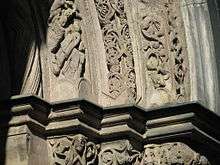
- Saint Godehard-Rotunda in Strzelin
- St. Giles-Church in Wrocław
- St. Nicolaus-Rotunda in Cieszyn
- Castle in Będzin
- Blessed Virgin Mary-Church in Lwówek Śląski
- Blessed Virgin Mary church in Złotoryja
- South part and ruins of the chapel in Piast Castle in Legnica
- Blessed Virgin Mary church in Środa Śląska
- St. John the Baptist church in Siewierz
- Świętokrzyskie
- St. Martin-Collegiate in Opatów
- St. Jacob-Church in Sandomierz
- St. Florian-Church in Koprzywnica
- Cistercians Abbey in Wąchock
- St. Giles-Church in Tarczek
- St. John the Baptist-Church in Grzegorzowice
- St. John the Baptist church in Skalbmierz
- West Pomerania
- Knights Templar chapel in Rurka
- Knights Templar chapel in Chwarszczany
- Cistercians Abbey in Kołbacz
Portugal
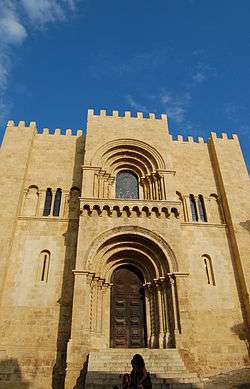
- Ganfei Convent in Valença, destroyed in 1000 by the Muslims, rebuilt in 1018, façade and main chapel changed in later periods, the rest of the temple is Romanesque
- Pombeiro Monastery in Felgueiras, began in 1059, only the apse and the portal are from this period)
- Church and tower of the Monastery of Rates in Póvoa de Varzim, Preromanesque, Romanesque reconstruction in 1096, most of the building remained intact since the 13th century
- Lisbon Cathedral, began in 1147. Romanesque portals and nave
- Braga Cathedral, began in the first half of the 12th century. Romanesque portals and nave
- Oporto Cathedral, began in the first half of the 12th century. Romanesque nave
- Castle of Almourol, built after 1160 by the Knights Templar
- Old Cathedral of Coimbra, began 1162
- Round church in the Convent of the Order of Christ in Tomar, 12th century, built by the Knights Templar
- Church of Cedofeita in Oporto, second half of the 12th century
- Travanca Monastery in Amarante, most of the building is from the 12th century, except the main chapel
- Domus Municipalis, Bragança
Romania
- St. Michael's Cathedral, Alba Iulia, began in 1009, reconstructed 1246-1291
- St. Michael's fortified church, Cisnădioara
Serbia
- Voljavča monastery (1050)
- The Tracts of Saint George monastery, Novi Pazar (1166). See Đurđevi stupovi built by Stefan Nemanja in the 12th century.
- Đurđevi stupovi, Montenegro, founded by Stefan Prvoslav, the nephew of Stefan Nemanja in 1213.
- The Studenica monastery (1190)
- Monastery of the Patriarchate of Peć (12th century)
- Pridvorica Monastery (12th century)
- Žiča crowning church, Kraljevo (1217)
- Mileševa monastery (1234)
- Morača (monastery) (1252)
- The Sopoćani monastery (1265)
- Gradac Monastery (1270)
- Tronoša Monastery (1276)
- Church of St. Achillius, Arilje (1296)
- Gračanica Monastery (1321)
- Visoki Dečani monastery, Kosovo (1327)
- Vojlovica monastery (1375)
- Ravanica Monastery (1375)
- Ljubostinja (1388)
- Kalenić monastery (1407)
Slovakia
- Boldog, Romanesque church with Gothic modifications.
- Spišská Kapitula, an ecclesiastical town with a Romanesque cathedral
- Nitra-Drazovce, a tiny Romanesque church on the hill above the village
- Levice-Kalinciakovo, a well preserved tiny Romanesque church built of hewn stone
Spain



Romanesque first developed in Spain in the 10th and 11th centuries and before Cluny`s influence, in Lérida, Barcelona, Tarragona and Huesca and in the Pyrinees, simultaneously with the north of Italy, into what has been called "First Romanesque" or "Lombard Romanesque". It is a very primitive style, whose characteristics are thick walls, lack of sculpture and the presence of rhythmic ornamental arches.
Romanesque architecture truly arrives with the influence of Cluny through the Way of Saint James, that ends in the Cathedral of Santiago de Compostela. The model of the Spanish Romanesque in the 12th century was the Cathedral of Jaca, with its characteristic apse structure and plan, and its "chess" decoration in strips, called taqueado jaqués. As the Christian kingdoms advanced to the South, that model spread throughout the reconquered areas with some variations. Spanish Romanesque has also influence of the Spanish pre-Romanesque styles, mainly the Asturian and the Mozarab. But there is also a strong influence of the moorish architecture, so close in space, especially the vaults of Córdoba`s Mosque, and the polylobulated arches. In the 13th century, some Romanesque churches alternated with the Gothic. Aragón, Castile and Navarra are some of the most dense areas of Spanish Romanesque.
- Basilica of San Isidoro, with "Royal Pantheon" León
- Zamora Cathedral
- Other Romanesque buildings in Zamora
- Benavente: Church of Santa María del Azogue
- Salamanca Cathedral
- Real Monasterio de Nuestra Señora de Rueda, Aragon region
- Monastery of Santo Domingo de Silos
- Santa María la Mayor, Collegiate Church, Toro, province of Zamora
- Ávila, Church of San Vicente
- Soria, Santo Domingo
- Carrión de los Condes Church of Santiago
- Carrión de los Condes Church of Santa María de las Victorias
- San Juan de Ortega Church
- Aguilar de Campoo Church of Santa Cecilia
- Monastery of Santa María la Real in Aguilar de Campoo
- Arenillas de San Pelayo Church of San Pelayo
- Barrio de Santa María Church of Santa Eulalia
- Cillamayor Church of Santa María la Real
- St. Martin, Frómista
- Olmos de Ojeda Church of Santa Eufemia
- San Salvador de Cantamuda Collegiate Church
- Soria San Juan de Duero, Cloister
- Arbás Church
- A lot of rural Romanesque churches of northern Burgos and Palencia
- The 20 Romanesque churches of Segovia
- Duratón La Asunción de María, church
- Fuentidueña Church of San Miguel
- Grado del Pico Church of San Pedro
- Perorrubio Church of San Pedro
- Requijada Church of Virgen de Las Vegas
- San Pedro de Gaillos Church
- Sepúlveda Church of San Salvador
- Estella San Pedro de la Rúa. Church and cloister.
- Estella Church of San Miguel
- Estella Palace of the Kings of Navarra
- Torres del Río Church of Santo Sepulcro
- Monastery of Leyre (San Salvador de Leyre) Abbey
- Sangüesa Church of Santa María la Real
- Santillana del Mar Collegiate Church and cloister
- Jaca Cathedral
- Loarre castle
- San Juan de la Peña
- Churches of San Caprasio and Saint Mary in Santa Cruz de la Serós
- Rural early Romanesque churches of Serrablo Huesca
- Sant Climent de Taüll, Vall de Boí
- Sant Miquel de Cuixà, Empordà
- Tarragona Cathedral Cloister
- Monastery of Santa Maria de Ripoll
- Terrassa Churches of Saint Mary (old Cathedral), Saint Peter and Saint Michael
- Lugo Cathedral
- Santiago de Compostela Cathedral
- Santiago de Compostela Gelmirez Palace
- Santiago de Compostela Santa María del Sar (Colegiata)
- La Coruña Church of Santiago
- La Coruña Collegiate Church of Santa María del Campo
- Noia Church of San Martiño
- Cathedral, Ourense, Romanesque and Gothic
- Church of San Juan of Portomarín
- Vilar de Donas, Monastery
- Sarria, Church
- Barbadelo, Church
- Church of San Juan Bautista (Talamanca de Jarama)
- Ermita de San Pelayo y San Isidoro, formerly in Ávila, moved to Madrid
Sweden and Scandinavia
Switzerland
- Abbey of Romainmôtier Abbey
- Church of Saint-Sulpice, Vaud
- Grossmünster Church, Zurich
- Payerne
Turkey
United Kingdom
England
In England, Romanesque architecture is often termed 'Norman architecture'. Castles, cathedrals and churches of the Norman period have frequently been extended during later periods. It is normal to find Norman in combination with Gothic architecture.
- Durham Cathedral is regarded as the finest Norman building in England.
- Peterborough Cathedral is an intact Norman cathedral except for the early Gothic west front and late Gothic eastern ambulatory.
- Ely Cathedral: the nave is Norman and west front Norman and Transitional
- Norwich Cathedral, excluding the Gothic spire and vault
- Canterbury Cathedral: the crypt, chapels and two small towers remain from the previous building destroyed by fire.
- Hereford Cathedral
- Southwell Minster
- St Albans Cathedral
- Gloucester cathedral, the nave arcades
- Tewkesbury abbey church
- Rochester Cathedral
- St Bartholomew-the-Great, Smithfield, London
- Patrixbourne Church, Kent
- Barfrestone Church, Kent
- Tixover church
- Bradford Church of St. Chad, West Yorkshire
- Kilpeck Church
- Leominster Priory
- Oakham castle hall, a unique survival in England of the hall of a Norman fortified manor house
- Tower of London: the keep known as the White Tower
- Norwich Castle
- Ludlow Castle
- Rochester Castle, Kent
- The Holy Sepulchre, Cambridge
- Waltham Abbey Church, Essex
Scotland
- Dunnottar Castle, older portions as Romanesque
- Muchalls Castle, ground level groin vault course only
- Myres Castle, undercroft only survives as Romaneseque
- St. Margaret's Chapel in Edinburgh Castle
See also
| Wikimedia Commons has media related to Romanesque architecture. |
- Romanesque architecture
- List of regional characteristics of Romanesque churches
- Romanesque secular and domestic architecture
- Pre-Romanesque art and architecture
- Ottonian architecture
- Romanesque art
- Romanesque sculpture
- Renaissance of the 12th century
- Romanesque Revival architecture
- Medieval architecture
- Romano-Gothic architecture

